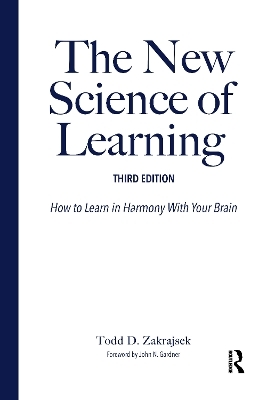
The New Science of Learning
Stylus Publishing (Verlag)
978-1-64267-500-9 (ISBN)
- Titel z.Zt. nicht lieferbar
- Versandkostenfrei innerhalb Deutschlands
- Auch auf Rechnung
- Verfügbarkeit in der Filiale vor Ort prüfen
- Artikel merken
By introducing new concepts, strategies, and applications related to learning and memory that are based on current findings in cognitive, social, and motivational psychology, this text offers a richer and more complete picture of how brain science illuminates how we learn. Students assigned this book will be equipped to design effective learning plans, employ new strategies, recognize learning traps, discover ways to work effectively in groups, improve recall, and realize better academic performance through test-taking and paper-writing strategies.
This new edition also addresses the concerns of all students—particularly those unfamiliar with the college setting and its expectations and assumptions—and offers strategies for success. In keeping with the preceding editions, this book introduces students to concepts, techniques, strategies, tips, and ideas to help them be academically stronger students, advance faster in their studies, and demonstrate what they have learned more effectively—in short, how anyone can learn to be a better learner by learning how to learn in harmony with their brain.
The book remains compact and student-friendly, offers examples of practice, and includes discussion questions at the end of each chapter.
Todd D. Zakrajsek is Associate Director of the Faculty Development Fellowship in the Department of Family Medicine at the University of North Carolina at Chapel Hill, U.S.A., and President of the International Teaching Learning Cooperative.
Foreword Acknowledgements Introduction 1. Your Host 2. Where This Book Came From 3. The Structure of this Third Edition A Note to Students A Note To Faculty PART ONE: SET UP FOR SUCCESS Chapter 1 - Learning from Multiple Perspectives A. Perspective Taking B. Ubiquitous Struggles 1. First-Generation College Students 2. Recognizing Individuality 3. Disarming Microaggressions 4. Stereotype Threat 5. Implicit Bias 6. Summary of Biases C. From Uneasy to Understanding D. Equity, Equality, and Accommodations E. Engaged Learning Chapter 2 - Discovering Yourself as a Learner A. Self-Regulation 1. Establish a Habit of Success 2. Managing Emotions B. Self-Efficacy 1. Performance Outcomes 2. Vicarious Experiences 3. Verbal Persuasion 4. Physiological Feedback C. Imposter Syndrome D. Learned Optimism Chapter 3 - Developing Your Learning Strategy A. Set Goals 1. SMART Goals a. Specific b. Measurable c. Achievable d. Relevant e. Timely 2. Break Large Goals into Smaller Goals 3. Stretch Goals B. Manage Multiple Tasks 1. Build Your Schedule 2. Manage Your Schedule 3. To-Do Lists 4. Organization C. Effective Communication Patterns 1. Be an Active Listener 2. How to Address Faculty 3. Make Use of Office Hours 4. Emails to Faculty 5. Following Up 6. Making Requests D. Keep the Big Picture in Mind PART TWO: BUILD THE FOUNDATION Chapter 4 – Facilitating Your Learning A. Theories and Models of Learning 1. Classical Conditioning 2. Operant Conditioning 3. Social Learning Theory B. Cognitive Load 1. Intrinsic Load 2. Extraneous Load 3. Germane Load a. Automaticity b. Schema Activation C. Deep Learning 1. Attention 2. Value 3. Understanding 4. Anticipate Success D. Foster a Better Memory 1. Memory Processes a. Encoding b. Consolidation c. Retrieval E. Memory Enhancements 1. Elaboration 2. Repetition 3. Interleaving 4. Spaced Recall Chapter 5 - Exploring Social Influences A. Mindset 1. The Origins of Fixed Mindedness 2. Spotting a Fixed Mindset 3. Mindsets are Context Specific 4. Views the World Based on Mindset 5. Shift to Growth Mindset B. Metacognition 1. Understanding Metacognition 2. Metacognitive Regulation C. Attribution 1. Intrinsic vs. Extrinsic 2. A Bit of Order 3. Fundamental Attribution Error D. Egocentric bias Chapter 6 - Finding and Using Patterns A. Patterns Enhance Learning 1. Chunking 2. Schemas and Cognitive Load B. Pervasive Patterns 1. Similarity 2. Proximity 3. Continuity 4. Closure 5. Figure-Ground C. Patterns in Academic Life 1. Content 2. Reading a. Pattern for Reading a Textbook b. Patterns for Reading a Journal Article c. Pattern for Reading a Novel PART THREE: SUPPORT YOUR LEARNING Chapter 7 - Thriving in Higher Ed A. Individual and Group Study B. Effective Study Time C. Prepare for Class D. Memorize Bloom’s Taxonomy E. Staying Productive in a Less than Ideal Lecture F. Learn Every Day/Avoid Procrastination G. Solicit and Incorporate Feedback H. Cheating and Plagiarism 1. Cheating 2. Plagiarism I. Office of Student Success/Student Disability Services J. Know your Campus Resources Chapter 8 - Demonstrating Your Learning A. Participation B. Homework C. Extra Credit 1. Learning Value 2. Additional Considerations D. Writing Papers 1. Your Instructor and the Syllabus 2. The Writing Center 3. Reference Librarians 4. Writing Tips in this Book E. Giving Presentations F. Test Taking Strategies 1. Text Anxiety Versus Test Nervousness 2. Study Strategies Chapter 9 - Avoiding Learning Pitfalls A. Rereading and Hi-lighting B. Cramming for Exams C. Following Your Learning Styles D. Task Shifting E. Listening to Negativity F. Hanging in There Too Long PART FOUR: KEEP IT GOING Chapter 10 - Sleeping to Enhance Learning A. What Researchers Say About Sleep 1. Circadian Rhythms 2. Stages of Sleep 3. Sleep Patterns: Larks and Night Owls B. Sleep, Learning, and Memory 1. Importance of Sleep 2. Remembering What is Important 3. Power of Naps and Restful Breaks 4. Cramming Versus Resting C. Managing Your Sleep 1. Factors that Disrupt Sleep a. Alcohol Consumption b. Caffeine c. Diet d. Technology 2. Factors that Promote Sleep a. Bedroom Environment b. Bedtime Routine c. Physical Activity and Being Outside d. Insomnia 3. Long-Term Brain Health and Sleep Chapter 11 - Exercising to Enhance Learning A. Health Benefits of Physical Activity B. Basic Brain Structures and Processes 1. Prefrontal Cortex 2. Hippocampus 3. Brain-Derived Neurotrophic Factor 4. Neurons, Synapses, and Neurotransmitters C. Effects of Long-Term Exercise on Learning D. Effects of Short-Term Exercise on Learning E. Timing of Exercise and Learning F. Therapeutic Exercises 1. Walking 2. Low-Impact, Anaerobic Therapeutic Exercise Chapter 12 - Being an Effective Group Leader/Member A. Benefit of Group Work 1. Develop Soft Skills 2. Incorporate Diverse Perspectives 3. Complete Large or Complex Projects B. Inventory Your Strengths and Challenges C. Get to Know Group Members 1. Introductions and Icebreakers 2. Commitment to the Project 3. Competing Demands D. Clarify Intended Goals E. Facilitate Group Processes 1. How the Group Will Be Led 2. How Decisions Will Be Made 3. Brainstorm Ideas 4. Proceed with Work 5. Find Times to Meet 6. Group Updates and Check-Ins F. Set Ground Rules 1. What If Someone Doesn’t Do Their Work? 2. What If Someone Misses a Meeting? 3. Ensuring All Voices Are Heard 4. Address Group Conflicts G. Effective Meetings 1. Agenda 2. Start and End on Time 3. Assign Group Roles a. Note-Taker b. Monitor c. Moderator d. Counter-Pointer e. Supporter 4. Brief Group Member Well-Check 5. End Meeting with Next Steps 6. Cancel the Meeting if Possible H. Common Challenges 1. Hogs and Logs 2. Losing the Way 3. Rushing to Wrap 4. Drama Appendix A – Online Learning A. Synchronous Online Courses B. Asynchronous Online Courses C. Tips for Setting and Sticking to Your Schedule A message from Dr. Z
| Erscheinungsdatum | 10.03.2022 |
|---|---|
| Sprache | englisch |
| Maße | 140 x 210 mm |
| Gewicht | 680 g |
| Themenwelt | Sachbuch/Ratgeber ► Gesundheit / Leben / Psychologie |
| Sozialwissenschaften ► Pädagogik ► Bildungstheorie | |
| Sozialwissenschaften ► Pädagogik ► Erwachsenenbildung | |
| ISBN-10 | 1-64267-500-8 / 1642675008 |
| ISBN-13 | 978-1-64267-500-9 / 9781642675009 |
| Zustand | Neuware |
| Informationen gemäß Produktsicherheitsverordnung (GPSR) | |
| Haben Sie eine Frage zum Produkt? |
aus dem Bereich


